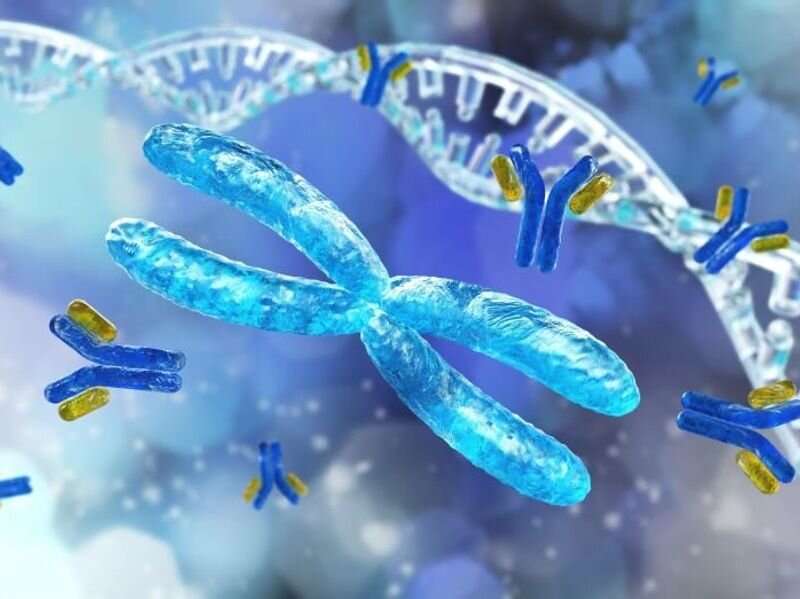This article has been reviewed according to Science X's editorial process and policies. Editors have highlighted the following attributes while ensuring the content's credibility:
fact-checked
peer-reviewed publication
reputable news agency
proofread
Scientists spot 32 proteins that hint at Alzheimer's risk

It's difficult to fully predict who will develop Alzheimer's disease in advance. Now, a new study suggests that certain markers in the blood may occur 10 to 20 years before the start of symptoms and could help doctors determine who is at high risk for dementia.
For the study, researchers analyzed 4,800-plus proteins in the blood of more than 10,000 middle-aged people (aged 45-65) over 25 years. They identified 32 proteins linked to the risk for dementia later in life.
"The biological changes occur outside the brain as early as middle adulthood in individuals at risk who develop dementia decades later," said study author Keenan Walker. He is an investigator in the Multimodal Imaging of Neurodegenerative Disease (MIND) Unit at the U.S. National Institute on Aging.
"These changes tell us a little about the specific biological processes that may go awry early on in individuals at risk for dementia," Walker added.
Now, the researchers plan to see if they can identify more proteins that may cause brain changes linked to Alzheimer's disease. "We think that by identifying causally relevant proteins, we can potentially identify new therapeutic targets," Walker said.
While many of these markers were found in the brain, some were associated with tissues outside the brain. For example, markers related to immune system function and the biological processes that regulate protein production, function and health changes occur at least 20 years before the onset of dementia.
"Later in the disease process, the proteins involved in the coagulation system and complement signaling pathway showed evidence of dysregulation," Walker said.
Coagulation, or the development of blood clots, has been linked to risk of Alzheimer's disease. The complement signaling pathway contains certain proteins that make up the beta-amyloid plaques and tau tangles that are hallmarks of Alzheimer's disease in the brain.
It's more than just markers in the blood that may foretell Alzheimer's disease risk, Walker said. Age is the most important risk for dementia, but other factors play a role, including the presence of heart disease.
The study is published in Science Translational Medicine.
The new study identifies several proteins that can be found in the blood and can help predict in midlife the progression to dementia later in life, said Percy Griffin. He is the director of scientific engagement at the Alzheimer's Association in Chicago.
"It is important to develop tools for early detection and accurate diagnosis of Alzheimer's and other dementia before people begin to display symptoms," said Griffin, who was not involved in the study.
No single biomarker can say this person will develop Alzheimer's disease or another type of dementia. "By combining several biomarkers, we can increase our confidence in a diagnosis," he said. "While more work and validation is needed, the opportunities found in this paper could add to that suite in the future."
Dr. Howard Fillit is the co-founder and chief science officer of the Alzheimer's Drug Discovery Foundation in New York City. He also reviewed the new study.
This research was made possible by the advent of proteomics, or the large-scale study of proteins. "Using this technology, researchers analyzed more than 4,800 proteins and worked their way down to a small subset that demonstrates the greatest prediction for developing Alzheimer's disease," Fillit said. "Years ago, we could look at one or two proteins at a time, and now we can look at 4,800, and that is a scientific tour de force."
It is an exciting time in Alzheimer's disease research for many reasons, he said.
In early July, the U.S. Food and Drug Administration approved Leqembi (lecanemab), a disease-modifying drug that may slow the progression of Alzheimer's disease by reducing amyloid plaques that form in the brain.
"Five to 15 years ago, if you said we could get rid of plaques, I would be astounded, but now we can do it, and that's incredible," Fillit said. "If we get rid of plaques, it seems that we can slow the disease down."
More information: Keenan A. Walker et al, Proteomics analysis of plasma from middle-aged adults identifies protein markers of dementia risk in later life, Science Translational Medicine (2023). DOI: 10.1126/scitranslmed.adf5681
Copyright © 2023 HealthDay. All rights reserved.


















